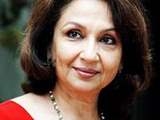Posted:
saifu's mom and dad were the origianal lovebirds! 😳
Its like a story straight out of a novel!
18 August 2010,Wednesday
From Tehelka Magazine, Vol 7, Issue 33, Dated August 21, 2010
COVER STORY
FREEDOM TO LOVE
'For us the world began and ended with each other'
Mansoor Ali Khan Pataudi & Sharmila Tagore DELHI BEEN TOGETHER 43 years BIGGEST HURDLE Public scrutiny, scepticism and communal outrage
Mansoor Ali Khan Pataudi & Sharmila Tagore DELHI BEEN TOGETHER 43 years BIGGEST HURDLE Public scrutiny, scepticism and communal outrage
WHEN WE met, Tiger hadn't seen any of my films and I was quite the cricket buff. Yet somehow, we got on famously from the start. He had a great sense of humour and was extremely charming. He was aware of Hindi cinema, just not of my presence in it! He loved Lata Mangeshkar and Vyjayanthimala, he was extremely fond of Indian music — Girish Karnad would tell me how Tiger always played Hindi music in his room at Oxford, when not playing the harmonium or the flute himself.
Back in the 1960s, I was not aware of any communal feelings. Although my grandmother wouldn't give money to the Muslim League because she had experienced the pain of Partition; we didn't harbour ill-will against any community. We were crazy about Yusuf Khan (Dilip Kumar), Madhubala and Bismillah Khan — art has a way of transcending boundaries. Tiger's family, however, was aware of the discrimination against Muslims. It would rear its head in unexpected ways — for instance, Muslims could work hard, but promotions would always seem to elude them. Tiger remembers sitting on the terrace of Pataudi with his father during the riots of 1947. Father and son bravely warded off the violent mob below with their 'machine gun' — the family's recently purchased refrigerator. Along with his cousins and siblings, Tiger was ultimately flown to the safety of his grandfather — the nawab of Bhopal's home — while his parents stayed behind to guard their subjects. These are things that leave indelible imprints on a child's mind. After his return from Oxford, he left Delhi to play cricket in Hyderabad — simply because he could not come to terms with the communal politics in the Delhi Cricket Board.
WHEN WE decided to get married, we didn't even know the words secular or communal — we were in the throes of young love; we didn't know what the fuss around us was all about. We weren't aware of the larger ramifications because for us, the world began and ended with each other. Being together wasn't really a deliberate defiance of norms, it just stemmed from an overwhelming desire to be together.
Tiger's family tried to dissuade him, on the grounds that I was Hindu and that I was an actress. My family's concern was that he didn't have a 9 to 5 job. His being a 'Nawab' evoked images of all kinds of debauchery for them! But we were economically independent, and absolutely convinced that we had to be together — so they came around. Even though our families had made their peace with us, there was the odd threat to disrupt our wedding plans. To be cautious, my parents obtained permission to have us married in a small ceremony at Fort William. But since some of our guests were from Pakistan, we could not get married there. The ceremony finally took place at a friend's home in Kolkata. One morning, I woke up to find two gentlemen from the CID in my sitting room. Apparently they had been sent from Delhi, for my 'protection'. I assured them I didn't need any, but they politely refused to budge. That was the political climate of India then — in spite of the fact that the man I had married was the captain of the Indian cricket team! A few weeks later, the Shankaracharya of Puri excommunicated me for marrying a Muslim.
Looking back, we realise how privileged we were. We belonged to the urban elite, both of us already had a national identity that transcended our religions. Even so, we were told we wouldn't last — apparently a serious institution like 'marriage' was not for 'fickle' young people like us. Thank god we proved them wrong!
As you become a parent, you learn to worry, to be afraid. But fortunately, the young are impervious to the machinations of the world. They have the courage to follow their hearts through treacherous terrain. This courage — which isn't a conscious will to defy, but is born of freedom and love — should be celebrated, not silenced.
As told to NISHITA JHA
http://www.tehelka.com/story_main46.asp?filename=Ne210810Forustheword.asp
18 August 2010,Wednesday
From Tehelka Magazine, Vol 7, Issue 33, Dated August 21, 2010
COVER STORY
FREEDOM TO LOVE
'For us the world began and ended with each other'
Mansoor Ali Khan Pataudi & Sharmila Tagore DELHI BEEN TOGETHER 43 years BIGGEST HURDLE Public scrutiny, scepticism and communal outrage
Mansoor Ali Khan Pataudi & Sharmila Tagore DELHI BEEN TOGETHER 43 years BIGGEST HURDLE Public scrutiny, scepticism and communal outrage
WHEN WE met, Tiger hadn't seen any of my films and I was quite the cricket buff. Yet somehow, we got on famously from the start. He had a great sense of humour and was extremely charming. He was aware of Hindi cinema, just not of my presence in it! He loved Lata Mangeshkar and Vyjayanthimala, he was extremely fond of Indian music — Girish Karnad would tell me how Tiger always played Hindi music in his room at Oxford, when not playing the harmonium or the flute himself.
Back in the 1960s, I was not aware of any communal feelings. Although my grandmother wouldn't give money to the Muslim League because she had experienced the pain of Partition; we didn't harbour ill-will against any community. We were crazy about Yusuf Khan (Dilip Kumar), Madhubala and Bismillah Khan — art has a way of transcending boundaries. Tiger's family, however, was aware of the discrimination against Muslims. It would rear its head in unexpected ways — for instance, Muslims could work hard, but promotions would always seem to elude them. Tiger remembers sitting on the terrace of Pataudi with his father during the riots of 1947. Father and son bravely warded off the violent mob below with their 'machine gun' — the family's recently purchased refrigerator. Along with his cousins and siblings, Tiger was ultimately flown to the safety of his grandfather — the nawab of Bhopal's home — while his parents stayed behind to guard their subjects. These are things that leave indelible imprints on a child's mind. After his return from Oxford, he left Delhi to play cricket in Hyderabad — simply because he could not come to terms with the communal politics in the Delhi Cricket Board.
WHEN WE decided to get married, we didn't even know the words secular or communal — we were in the throes of young love; we didn't know what the fuss around us was all about. We weren't aware of the larger ramifications because for us, the world began and ended with each other. Being together wasn't really a deliberate defiance of norms, it just stemmed from an overwhelming desire to be together.
Tiger's family tried to dissuade him, on the grounds that I was Hindu and that I was an actress. My family's concern was that he didn't have a 9 to 5 job. His being a 'Nawab' evoked images of all kinds of debauchery for them! But we were economically independent, and absolutely convinced that we had to be together — so they came around. Even though our families had made their peace with us, there was the odd threat to disrupt our wedding plans. To be cautious, my parents obtained permission to have us married in a small ceremony at Fort William. But since some of our guests were from Pakistan, we could not get married there. The ceremony finally took place at a friend's home in Kolkata. One morning, I woke up to find two gentlemen from the CID in my sitting room. Apparently they had been sent from Delhi, for my 'protection'. I assured them I didn't need any, but they politely refused to budge. That was the political climate of India then — in spite of the fact that the man I had married was the captain of the Indian cricket team! A few weeks later, the Shankaracharya of Puri excommunicated me for marrying a Muslim.
Looking back, we realise how privileged we were. We belonged to the urban elite, both of us already had a national identity that transcended our religions. Even so, we were told we wouldn't last — apparently a serious institution like 'marriage' was not for 'fickle' young people like us. Thank god we proved them wrong!
As you become a parent, you learn to worry, to be afraid. But fortunately, the young are impervious to the machinations of the world. They have the courage to follow their hearts through treacherous terrain. This courage — which isn't a conscious will to defy, but is born of freedom and love — should be celebrated, not silenced.
As told to NISHITA JHA
http://www.tehelka.com/story_main46.asp?filename=Ne210810Forustheword.asp








comment:
p_commentcount